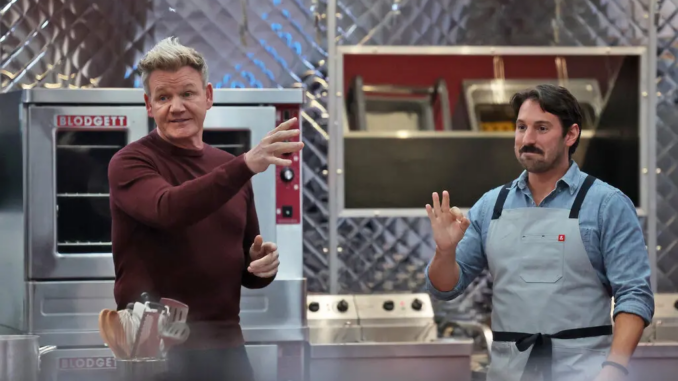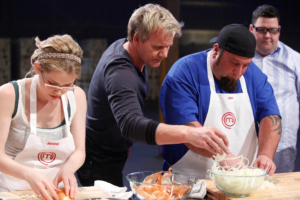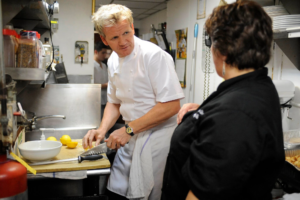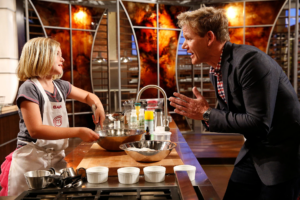
Gordon Ramsay Isn’t Going Anywhere
Gordon Ramsay insists he never wanted to be the bad boy. His image as the brash, bellicose chef and restaurateur, as the master of the culinary meltdown, was, he said, largely a matter of getting off on the wrong foot.
Ramsay was introduced to British viewers on “Boiling Point” (1999), a five-part series on Channel 4 chronicling his turbulent efforts to open his first restaurant. At around the same time, BBC Two launched “The Naked Chef,” a breezy, upbeat cooking show starring the young chef Jamie Oliver. The two shows, and the two chefs, could hardly have seemed more different.On the one hand, you had Ramsay, a surly perfectionist, firing a waiter for drinking water in view of customers. “And then literally at the same time, on another channel, there was Jamie,” he recalled in an interview last week, “this floppy-haired Essex boy, sliding down the banister doing one-pot wonders.”

“The nation fell in love with him,” Ramsay said. Whereas with himself, he added, “the nation wondered what the hell was going on.”Ramsay’s explanation may not entirely account for his enduring infamy as an explosive TV tyrant — it wasn’t Oliver, after all, who named Ramsay’s signature series “Hell’s Kitchen,” and he hardly forced Ramsay to bludgeon countless chefs and restaurant owners with colorful jeremiads for the past 25 years on air. But that Ramsay still brings up old rivalries when discussing his reputation is revealing, a glimpse of the competitive intensity that has been crucial to his continuing success.
That competitiveness is one reason that the host of roughly two dozen shows over the years, including “Next Level Chef,” returning on Sunday for its third season on Fox, still devotes so much of his down time to watching other food shows. It’s why, during the pandemic lockdown, he threw himself headlong into social media. And it’s also why, at 57, Ramsay has no intention of calling it quits.“When I started this career, it was nothing to do with money — it was passion and the drive to be the best,” he said. “The longevity comes down to not taking anything for granted.”

If Britain was ever truly skeptical of Ramsay, it’s safe to say that it and much of the world have come around. Today, he is one of the most recognizable names in television, the producer and star of popular reality shows on the BBC, ITV and Channel 4 in Britain and on the National Geographic network and Fox in the United States. “Hell’s Kitchen,” the competitive cooking series he has hosted on Fox since 2005, just wrapped its 22nd season on Thursday; Ramsay estimates he has shot over 1,200 hours of content for Fox alone.
“Next Level Chef,” one of his newest shows, is a kind of cooking gantlet in which a mix of home cooks, social media influencers and professional chefs compete across an elaborate three-tiered arena.Ramsay called it a “smorgasbord of all the best bits that have worked on various shows,” combining the rapid-fire live services of “Hell’s Kitchen” with the extreme scrutiny of “MasterChef.” It also displays Ramsay’s softer, more encouraging side, seen on shows like “MasterChef Junior,” where he is more paternal hype man than shrieking despot.“Gordon really appeals to every member of the household,” Rob Wade, the chief executive of Fox Entertainment, said in an interview. “There’s just enough edge to entertain the older viewer, and just enough comedy to entertain the younger viewer, and I think his authenticity is so apparent that people are drawn to him.”

But even after a quarter-century in front of the camera, Ramsay insists he does not see himself as an entertainer. “I’m not a TV chef,” he maintained when asked about his show business career, despite the impression some may have of him. He elaborated: “I’m a serious chef, and I happen to work on TV.”
It is true that Ramsay was already well-established in the culinary world before he became a TV star. A former protégé of decorated chefs including Joël Robuchon and Marco Pierre White, he opened his first restaurant, Restaurant Gordon Ramsay, in 1998, earning three Michelin stars within a few years. He was the first Scottish chef to earn that distinction, going on to amass 17 in total, of which he currently holds seven, including for Pétrus, in London, and Le Pressoir d’Argent, in Bordeaux.
Some of his other restaurants are less esteemed. His international burger chains have gotten mixed reviews, while the Hell’s Kitchen chain in the United States is effectively a Planet Hollywood-type novelty that promotes the series and vice versa. The more than 80 restaurants operated today by Gordon Ramsay Holdings combine for a powerful brand, though he says that they remain a passion — one he draws on for inspiration.
